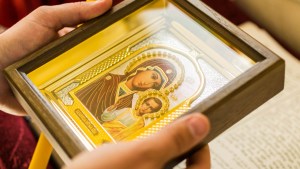“Air is an icon of God.” The thought came to me suddenly, and I shared it out loud in the kitchen.
“I know,” my daughter, who was doing the dishes, said. “It’s everywhere, and we depend on it to live and you can’t see it but when you are missing it everything is terrible.”
We looked at each other, surprised. “Hey, that’s kind of true,” I said. Then we thought of more ways air is an icon of God.
- “It carries blessings to us,” she said.
- “It holds birds and airplanes up, almost magically,” I said.
- “It gives you a voice,” she said
- “It sustains you in being,” I said. “You die without it.”
In fact, air is an icon of God, and we weren’t the first to notice it. Here are five ways to use this powerful icon.
First: Be as grateful for God as you are for air.
The words “Blessed are the poor in spirit,” literally mean, “How fortunate those who beg for their life’s very breath!” says Erasmo Leiva-Merikakis in Volume One of his meditations on the Gospel of Matthew.
“We depend on God in the same way that our lungs and our voice depend on air,” he continues. “Air is like grace, the sine qua non [the essential thing] of our life and very existence.”
Air is like the breath of God that makes us human. Think of God breathing into Adam’s nostrils in the second creation story of Genesis, and then remember that God is outside of time, so his creation is not just a thing of the past. He creates continually, and we depend on him moment to moment. Air is the icon of God’s continuing creative act.
Second: Respect the power of God, like air.
When I brought up my thoughts on air with Benedictine College philosopher Andrew Jaeger, he reminded me about the ancient view of the elements: earth, air, fire and water. There was even a debate about which of the elements was fundamental, he said, and the pre-Socratic philosopher Anaximenes argued all things were made of air.
“Just as our soul which is air holds us together, so breathe and air surround the whole cosmos,” he wrote. Cicero was intrigued by his argument, saying, “Anaximenes said that air is god, and that it is boundless and infinite and always in motion.”
When St. Paul taught the men of Athens at the Areopagus he quoted this kind of idea of God, saying: “In him we live and move and have our being.”
We don’t see it, but air is bigger and stronger and surrounds the biggest things we do see. It doesn’t need us, but we depend on it every moment. It never changes, but it changes everything. It can move a feather gently to the ground or make steel girders bend.
Maybe the singer Ani DiFranco said it best. “Buildings and bridges are no match for the air my friend,” she sang. “What doesn’t bend, breaks.”
We need to respect God that way, and bend for him.
Third: Be driven by the Holy Spirit like wind.
Jesus was driven by the Holy Spirit into the desert to fast and be tempted. He described the Holy Spirit to Nicodemus this way: “The wind blows where it wills, and you hear the sound of it, but you do not know whence it comes or whither it goes; so it is with everyone who is born of the Spirit.”
That is exactly what the Apostles found at Pentecost: The Holy Spirit drove them to do things they never dreamed of.
Pope Francis said this is just as true for us, and we can take full advantage of it with a strong sail:
“Hope is truly like a sail. It gathers up the wind of the Holy Spirit and transforms it into a driving force that moves the boat forward towards the safe harbor of eternal life.”
Fourth: Breathe in prayer like you breathe air.
In the classic The Way of the Pilgrim,a wandering Christian doesn’t understand how St. Paul could have exhorted Christians to “pray always.” He travels far and wide to try to ask wise Christians if this is even possible. He finds his answer in a passage of the ancient Philokalia, which instructs:
“As you breathe out, say ‘Lord Jesus Christ, have mercy on me.’ Say it moving your lips gently, or simply say it in your mind. Try to put all other thoughts aside. Be calm, be patient, and repeat the process very frequently.”
He became devoted to “the Jesus prayer,” and so have many Christians since. In his book Consoling the Heart of Jesus, Father Michael Gaitley shares a similar practice of breathing in prayer the words “Ecce, Fiat, Magnificat” as described here.
Fifth: Join the saints in praising air.
St. Francis of Assisi prayed: “Be praised, my Lord, through Brothers Wind and Air, and clouds and storms, and all the weather, through which you give your creatures sustenance,” he said.
St. John Chrysostom expanded the image. “The whole air is filled with angels,” he said. And St. Francis de Sales prayed: “Let God be the air in which your heart breathes at ease.”
My daughter and I put it simply: “Thank you, God, for air!”



